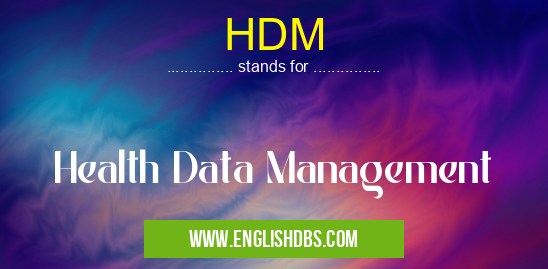What does HDM mean in MANAGEMENT
HDM (Health Data Management) refers to the systematic organization and management of health-related information and data. It involves the collection, storage, retrieval, analysis, and dissemination of patient records, clinical data, and other healthcare-related information.

HDM meaning in Management in Business
HDM mostly used in an acronym Management in Category Business that means Health Data Management
Shorthand: HDM,
Full Form: Health Data Management
For more information of "Health Data Management", see the section below.
» Business » Management
Key Elements of HDM
- Data Collection: Gathering health-related data from various sources, including patient surveys, electronic health records, lab tests, and medical imaging.
- Data Storage: Securely storing health data in databases or cloud-based systems to ensure its integrity and accessibility.
- Data Retrieval: Quickly and efficiently accessing specific health data when needed for patient care, research, or other purposes.
- Data Analysis: Using statistical and analytical techniques to identify trends, patterns, and insights from health data.
- Data Dissemination: Sharing or distributing health data in a controlled and responsible manner for research, quality improvement, or decision-making.
Benefits of HDM
- Improved patient care: Accurate and timely access to health data facilitates evidence-based decision-making and personalized treatment plans.
- Enhanced research: HDM enables researchers to study large datasets and gain insights into disease patterns, risk factors, and potential treatments.
- Better policymaking: Health data can inform healthcare policies and interventions, leading to improved population health outcomes.
- Cost optimization: By streamlining data management processes, HDM can reduce healthcare costs and improve resource allocation.
Essential Questions and Answers on Health Data Management in "BUSINESS»MANAGEMENT"
What is Health Data Management (HDM)?
Health Data Management (HDM) is the process of collecting, storing, managing, and analyzing health data to improve patient care, research, and public health. HDM involves a wide range of activities, including:
- Establishing and enforcing data standards
- Implementing data security measures
- Developing data management systems
- Training staff on data management practices
- Conducting data analysis
- Reporting and disseminating data findings
What are the benefits of HDM?
HDM offers numerous benefits for patients, healthcare providers, and the healthcare system as a whole. These benefits include:
- Improved patient care: HDM can help healthcare providers make more informed decisions about patient care by providing them with access to accurate and up-to-date health data.
- Reduced healthcare costs: HDM can help to reduce healthcare costs by identifying and eliminating waste and inefficiencies.
- Enhanced research: HDM can facilitate research into new and improved treatments for diseases.
- Improved public health: HDM can help to improve public health by tracking and preventing the spread of diseases.
What are the challenges of HDM?
HDM faces a number of challenges, including:
- Data security: Health data is sensitive and must be protected from unauthorized access and use.
- Data interoperability: Health data is often stored in different formats and systems, making it difficult to share and analyze.
- Data quality: Health data can be inaccurate, incomplete, or outdated, which can lead to incorrect conclusions.
- Lack of trained staff: HDM requires skilled staff who are knowledgeable about data management practices.
What is the future of HDM?
HDM is rapidly evolving, and there are a number of emerging technologies that have the potential to revolutionize the field. These technologies include:
- Artificial intelligence (AI): AI can be used to automate data management tasks, improve data quality, and identify trends and patterns in data.
- Blockchain: Blockchain is a distributed ledger technology that can be used to secure and share health data.
- Internet of Things (IoT): IoT devices can be used to collect and transmit health data from patients and devices.
Final Words: HDM is a critical component of modern healthcare systems. It ensures the efficient management and utilization of health data to improve patient care, support research, inform policymaking, and optimize healthcare delivery.
HDM also stands for: |
|
| All stands for HDM |
